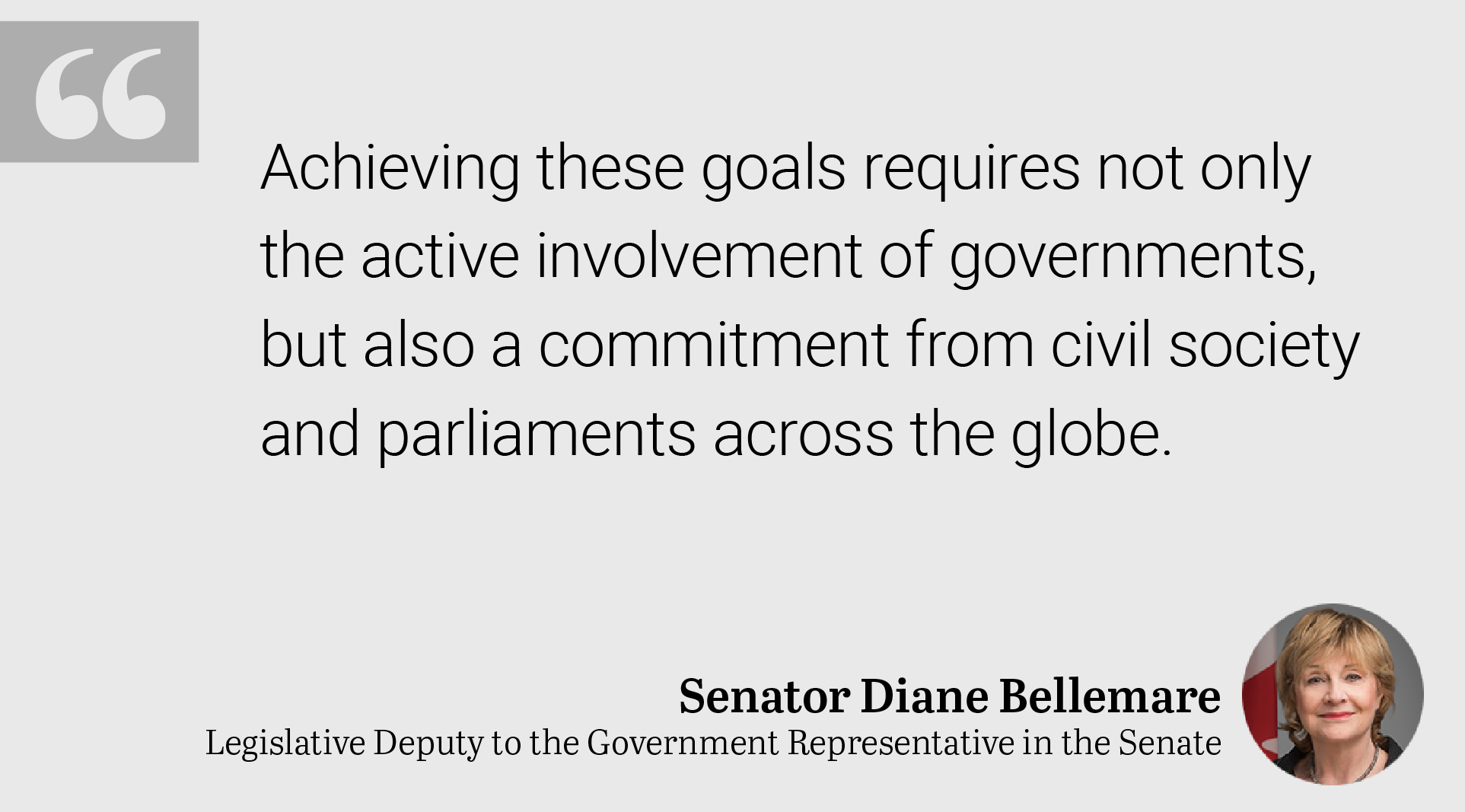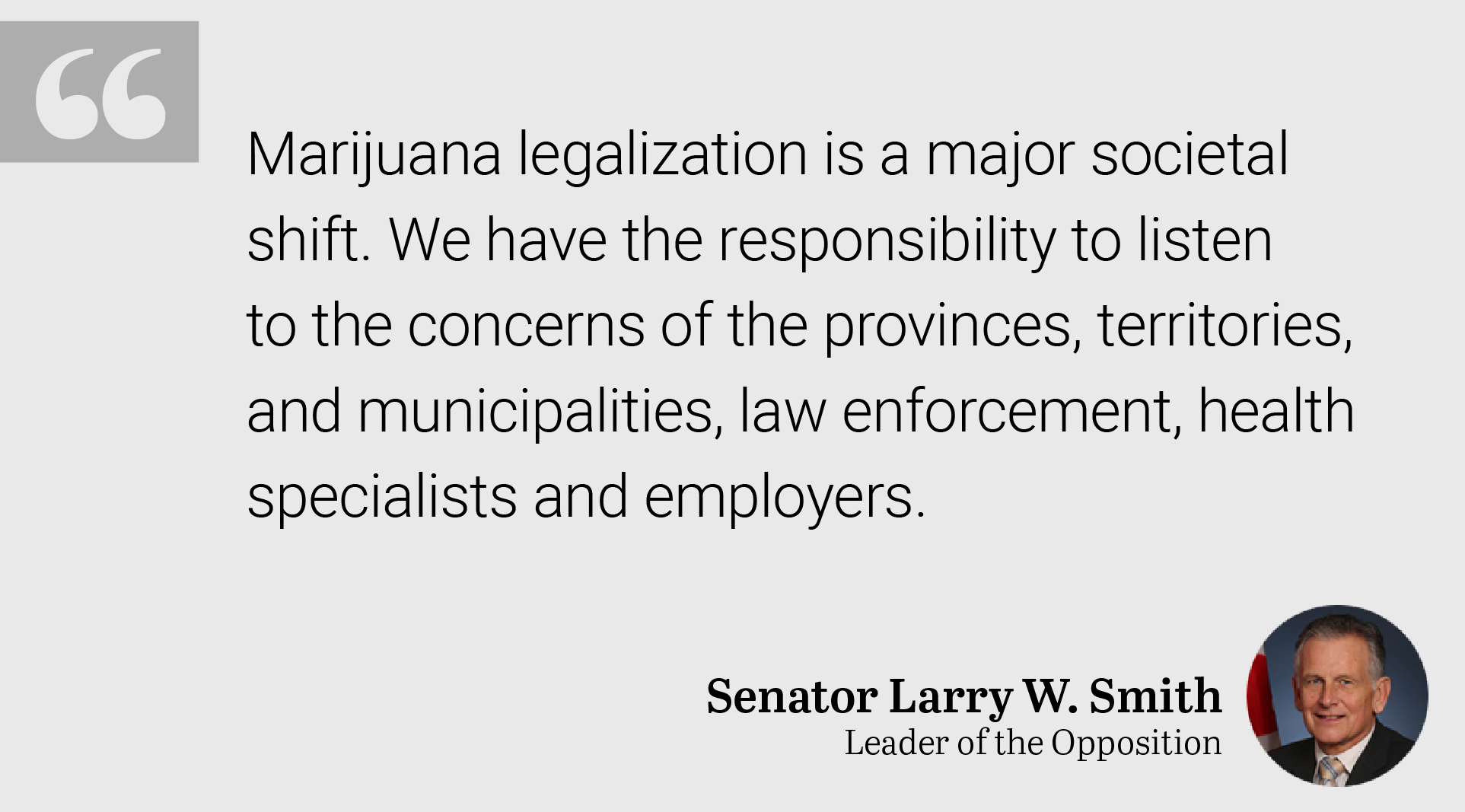Perspectives - February 13-15, 2018

Last week at the Senate: advancing sustainable development, debating cannabis legislation, reactions to the Colton Boushie case and amending a bill on diversity in the boardroom.

Government
In January, I rose in the Senate to bring attention to the importance of encouraging not only the Government of Canada, but also Parliament to consider the United Nation’s 2030 Agenda when drafting legislation and developing policies relating to sustainable development. The 2030 Agenda, adopted in 2015 at the United Nations, contains 17 sustainable development goals and 169 associated targets. These goals and targets cover the economic, social and environmental aspects of sustainable development. Canada is one of the 193 member States that have pledged to achieve these global goals by 2030.
This agenda includes a truly innovative conception of sustainable development, linking the fight against poverty with climate change. It also calls for the implementation of goals with universal results for all countries.
Given its scope, some will certainly see the 2030 Agenda as utopian. While it is indeed an ambitious agenda, it is necessary to preserve the sustainability of our planet and the prosperity of those who live on it.
Achieving these goals requires not only the active involvement of governments, but also a commitment from civil society and parliaments across the globe. This means that it is up to parliamentarians and our country’s politicians to promote this agenda, bring forward effective strategies and encourage others to join in this collective campaign. That is why I encourage my fellow senators to get involved in this Agenda, a global response to the world’s most urgent problems.

Opposition
As you may know, the Senate is beginning the review of Bill C-45 (legalization of marijuana) and Bill C-46 (impaired driving). The Senate Conservative Caucus has been clear from the beginning that we will not proceed in an obstructionist manner. Instead, we will give a voice to those in the Canadian public who have significant and valid concerns about the policy choices the government is making.
This week we secured an agreement permitting for a timeline that will allow the Senate to have a thorough evaluation on the Marijuana legislation. In the coming weeks, senators will proceed with extensive hearings. It will allow the Senate to perform its due diligence and focus on the impacts this legislation will have on our children and youth, public safety, law enforcement and public education requirements.
The Senate Conservative Caucus will be looking at making recommendations on various legislative voids, including: driving under the influence; public consumption; home grow; outdoor grow; detection of high concentration of marijuana; border crossing; lack of education campaigns; the negative impact of marijuana especially for youth under the age 25 and other major regulatory gaps. We believe possible amendments would bring greater protection to what is most important – the health and public safety of Canadian families and neighborhoods.
Marijuana legalization is a major societal shift. We have the responsibility to listen to the concerns of the provinces, territories, and municipalities, law enforcement, health specialists and employers.
We have the responsibility to review the government’s legislation thoroughly!

Senate Liberals
On February 13, I made a Senator Statement on the news of the jury verdict in the Colten Boushie case. I offered my deepest sympathies to the family of Colten Boushie, a young man from the Red Pheasant First Nation in Saskatchewan. In August 2016, Colten was killed by a bullet fired into the back of his head by Gerald Stanley, a white farmer. Stanley’s lawyer argued that the gunshot was accidental through a rare phenomenon called a “hang fire.” Stanley was acquitted on Friday, February 9. The trial occurred amidst a strong undercurrent of racism against indigenous people in Saskatchewan. Questions are being raised about the fairness of having an all-white jury.
During the jury-selection process, potential jurors who were visibly indigenous were deliberately excluded by peremptory challenge by Stanley’s lawyer. While this is legally permissible, many have questioned whether it should be, particularly when it is well known that Saskatchewan has a high level of racism towards Indigenous people.
Decades ago, this practice of peremptory challenge was identified as a major problem for Indigenous people in Manitoba. Reconciliation is not possible as long as personal bias and racism are so obviously embedded in our jury system. Challenges to a jury selection should be for justified reasons and not for personal biases or racism against indigenous candidates.
Enough is enough. The government must move immediately to set in motion real actions to end the current practice of peremptory challenges. We, the indigenous people of Canada, deserve better.

Independent Senators Group
This past week Senator Massicotte introduced an amendment to Bill C-25, An Act to amend the Canada Business Corporations Act, the Canada Cooperatives Act, the Canada Not-for-profit Corporations Act, and the Competition Act, which would compel corporations to set their own goals and timetables for board diversification. Every year, corporations would be required to report their progress on diversification to shareholders and the Minister of Innovation, Science and Economic Development. Aggregated data from all Canadian corporations would then be distributed to Parliament and the public.
I believe this amendment strikes the correct balance between corporate autonomy and social responsibility. There is nothing in this amendment that tells a corporation how many women or minorities they have to have on their board. It does not allow the government to set quotas. Instead, this amendment recognizes that a mining company may face very different realities than an energy company, a bank or an insurance company. As such, it provides corporate boards with the autonomy to set targets for gender and for broader diversity groups that they believe are attainable given the unique circumstances they face. In addition it hands parliamentarians and the Canadian public the tools to monitor progress on diversification across sectors.
I am proud of the work that senators Massicotte, Joyal, Omidvar, Moncion and Pratte have put into this amendment and I am confident it will generate increased diversity in boardrooms and executive management, while providing corporations with the requisite latitude to excel in Canada’s growing economy.


